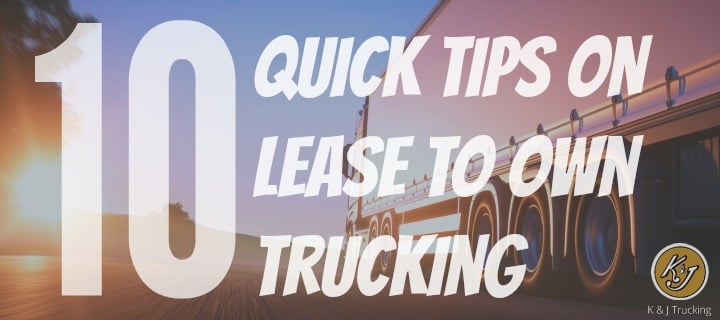10 Quick Tips on Lease to Own Trucking
While there are several types of lease programs for big rigs, no matter which type you choose you need to do your research first. It is a great way to make good money in the business if you know what you are doing! Here are 10 quick tips to review before you make the leap into leasing a big rig.
For more guidance on starting your own trucking business, click here.
1. Read the contract.
This should be obvious, but we hear of way too many drivers getting stuck with terms that leave them in a horrible financial situation simply because they didn't read. If you don't understand the contract, hire a contract lawyer. A small hourly lawyer fee now can avoid a lot of heartache later.
2. Know your household expenses.
A popular term these days is house poor, referring to a mortgage payment that is way too high for your income. But just like being house poor, you do not want to be truck poor. You need to be able to make a big enough payment on your truck to keep up with the depreciation but not so big that you can’t afford it. Know all your expenses and leave some space in your budget for emergencies.
3. When you lease you don’t get depreciation tax write offs.
You can write off lease payments, but not depreciation. The owner of the truck (the company you are leasing from) is the one who gets the depreciation tax benefits.
4. Plan to pay down market depreciation AS YOU GO.
Make sure your payment is big enough to keep up with the current market value of your truck. You don't want to sell your truck for market value and still owe on it. Try to anticipate market depreciation and try to keep your truck loan as close to the street value as you can so that you can sell at any time and not have any loan left remaining. If your truck payment needs to be so large that you can't keep up with your other bills, then maybe you should consider waiting to purchase a truck.
5. Put away money for maintenance, emergencies and taxes.
Save for repairs and emergencies because they are not an if, but a when. When you lease, you are your own boss. No one else is putting into a retirement account for you. Make sure you are putting away money for your future and investing wisely so you can have the retirement you desire. Also, put money away for taxes. You don't want April to come and be surprised.
6. Have a bookkeeper.
A bookkeeper and accountant will be vital resources as you begin a lease-to-own trucking journey. Talk with them before you get started to go over your budget and find out what they would recommend for budgeting taxes and other business expenses. They will also be able to show you what expenses to track with receipts. Once you've established this relationship, use them! They are experts for a reason.
7. Make sure your insurance covers your note.
Underinsuring seems like a good financial decision until it suddenly doesn't; like when you are in an accident or your truck is damaged by hail or high winds. Carrying breakdown and tow insurance is also a good idea. Conversely, don't overinsure your truck either. Insurance will only ever pay you the normal market value of your truck, not what you owe or what you've insured the truck for with the insurance company.
8. Know what, if anything, the leasing company covers.
If you lease your truck to a carrier, they normally pay for general liability insurance; but don't assume this. The insurance most operators carry themselves is bobtail and physical damage insurance. Your carrier will most likely require bobtail insurance for when you are off-duty and using your truck for personal conveyance. The bank or leasing company will require physical damage coverage in case of an accident.
9. Know your numbers.
What is your break even? How many loads do you need to run in order to make payments? Is that reasonable? Budget for fuel, fuel taxes, food, etc. Don't just drive and fly by the seat of your pants. That is a quick way to financial ruin. You can be nickeled and dimed to death by the little things if you aren't careful.
10. This isn't for the weak willed.
Are you disciplined? Owning your own owner operator business is not for the faint of heart. It is a rewarding and exciting career path, but it has challenges that need to be fully considered before you leap in. Talk to other owner operators and get their advice. Find out what they love about their job and don't rush your decision. You can absolutely make great money as an owner operator, but you have to be prepared and disciplined.


